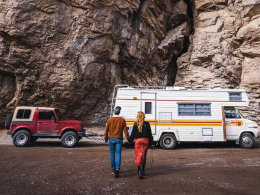Maybe you’ve seen the popular YouTubers Gabby and Brian from Nomadic Statik or Kara and Nate, who have traveled all over the world. You like the idea of traveling in a van, but you’re wondering if you could really make it work.
Is it realistic to live in a van? Do these couples just make it look easy?
Let’s take a closer look at what the van life really looks like apart from YouTube, Instagram, and TikTok. There are great moments captured on camera, but it can’t be all sunsets and s’mores, right?
Let’s dive in!

Is Living in a Van a Good Idea?
Living in an RV is stressful. Tiny living spaces, little privacy, maintenance and repairs, and isolation from family and friends are just a few of the challenges.
But living in a van is even more difficult. The space is even tinier, and there’s even less privacy. So to determine if living in a van is a good idea, you have to evaluate your own personal style. It works out great for some people, and it’s an awful experience for others.
Living in a van means your home and car are in the same space. Will you be able to transition into that kind of lifestyle? Can you handle being alone and away from family and friends? If you’re traveling with someone else, will you enjoy life in close quarters?
Living in a van is only a good idea if it suits your interests, desires, and lifestyle.
Are You Allowed to Live in a Van?
You can live in a van, but you’ll have to register your domicile in a state. You have to pay state taxes, register your vehicle, follow homeschool laws, etc. So you have to establish a domicile somewhere. But you don’t have to live there.
You also have to be careful where you park your van overnight. You can’t just pull off the interstate. First, it’s not safe. Second, it might not be legal. If you’re not going to stay at campgrounds or use a boondocking membership like Harvest Hosts, make sure it’s safe and legal to park overnight in whatever location you choose.
What Are the Benefits of Van Life?
Not all van lifers save money by moving into a van, but many do. Often, living in a van reduces monthly bills and leads to financial freedom. Remaining stationary for longer periods also helps to save money. There are fewer financial obligations when living in a van.
The primary benefit and reason most people transition to van life is the freedom and exploration the lifestyle provides. Are you tired of ocean views and sandy beaches? Then pack up and head to a national park. When you’ve done enough skiing in the Rocky Mountains and are ready to embrace sunshine and surfboarding, simply move. The places you visit, the people you meet, and the different cultures you encounter are all perks to van life.
Another advantage is always having your stuff with you. There’s no packing up and lugging a suitcase to hotel after hotel. Whenever you pull into a site at a state park, everything you own is with you. The convenience of getting to anything you need at all times is a huge benefit.

What Are the Downsides to Van Life?
One downside to living in a van is showering. Some vans come equipped with a wet bath, which means you have a separate area to shower, wash your hands, and use the toilet. But this space is tiny, and when you shower, everything gets wet. There’s no separation between the shower and the sink and toilet. Dealing with this kind of bathroom is challenging and can get old after a while.
Finding public showers can be difficult for van lifers who don’t have a wet bath or who just don’t want to use it. Gyms, yoga studios, state parks, and other locations generally have public showers, but they often charge a fee. This can get expensive. You may also be camping somewhere where there are no locations that provide showers.
Another downside to living in a van is the tiny space. It can be hard to get rid of most of your things. It can be hard to learn to live without certain conveniences. And if you’re living with another person, sharing a tiny space is a challenge. Trying to cook in a small kitchen while your spouse is working while the dog is lying on the floor can make evenings stressful.
Finally, finding locations to fill up with water and dump the tanks can also be frustrating. Like the shower situation, you might be camping somewhere where the nearest dump station is hours away. This makes planning ahead even more important, which can add stress. Will you have enough water to last you? What will you do if the tanks fill up faster than you anticipate?
Most of these cons just require adaptability. If you can’t adapt to change, you won’t enjoy living in a van. If you’re high maintenance, you won’t enjoy living in a van. Most people who live the van life have learned to adjust to these nuances and frustrations.
Is Van Life Easy?
Again, this comes down to personal style. If you’re low maintenance and don’t have to have the latest gadgets or modern conveniences, the van life can be easy.
The minimalist life can make life easier because you’re not focused on stuff. You enjoy the experiences van life provides.
But when it’s time to make repairs, the van life can be quite difficult. Your van is your home and your car, so it’s a huge inconvenience when something has to get fixed. When things don’t work properly, it can ruin a camping experience.
When you expect to go hiking in Arches National Park but have to spend the day fixing a leak, it’s disappointing and frustrating. Your ability to adapt and “go with the flow” will determine how easy and enjoyable living in a van will be.
Is Van Life Lonely?
The van life certainly can be lonely. If you’re a solo traveler venturing all over the world, your Instagram feed and YouTube videos may be full of amazing, memorable experiences. But when it’s time to settle in for the night, it can be lonely knowing you’re thousands of miles away from family and friends.
Meeting people on the road is one of the perks of living in a van. Sometimes you’ll meet up with other travelers, learn their stories, and plan to meet up again. Sometimes you’ll make friends with other van lifers and go traveling together for a while. Isolation and loneliness are unavoidable at times, but making an effort to stay in touch with family and friends while also intentionally meeting new people on the road will help.

What Do Van Lifers Do for a Living?
Many people who travel work remotely. Either their work at a sticks-and-bricks location transitioned over to remote work, or they started a new venture.
The actual work varies tremendously. Some van lifers are travel blog writers. Others are photographers. Some do online coaching. And then there are others who travel because of their work, like travel nurses or gas line workers.
Is Living in a Van Realistic?
Lots of people have chosen to live in vans. Their reasons vary, but it’s certainly realistic. It’s not always easy. It’s not always comfortable. And it’s certainly not always convenient. But the van lifers who have made this lifestyle work have learned how to adapt and believe the benefits exceed the downsides.
So what do you think? Could you transition to van life?
If You Want the Latest Travel News, Join Our Mailing List
Don’t rely on biased RV industry news sources to keep you informed. Stick with Nomadic News. We publish articles and breaking stories that matter to you every weekday.










